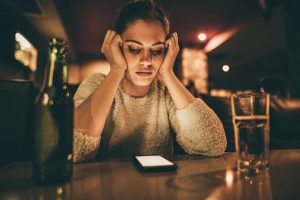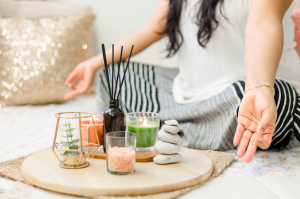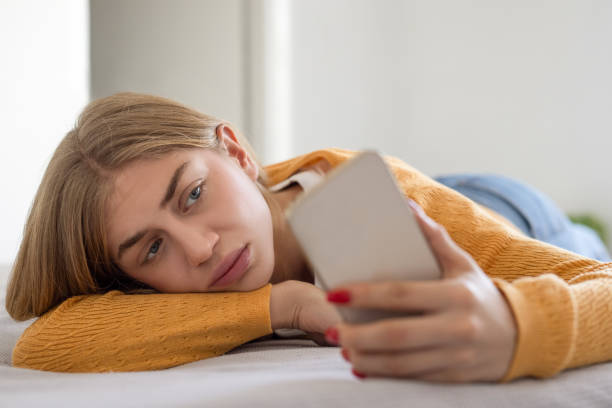It shouldn’t be news to anyone that sleep is a necessity. Along with consuming water and nourishment and moving our bodies daily, it tops the list of basic human needs. Unfortunately, the quality and quantity of sleep can vary based on a multitude of factors, thereby varying our quality of life. Some of the benefits of getting adequate rest include an improved immune system, better memory and productivity, and better mental health, among others.
Why is sleep so important for my mental health?

Insomnia can both be caused by and exacerbate mental health issues. We know through studies that depression, anxiety, and addiction can cause sleep disturbances; these sleep disturbances then intensify these difficult emotions. A shortage of sleep leads to poor concentration, short attention span, and memory impairments. Emotional instability – such as a decrease in patience and flexibility – can result in impulsive and reactive behavior. We owe it to ourselves and others to be well-rested and ready to approach our daily lives with an open mind and thoughtful, logical behavior.
There will be times in our lives when we cannot help our sleep schedule: a period of overtime at work, caring for a newborn (or, at a later stage, when a child goes through sleep regression). The key is to reduce the reasons we have for poor sleep as much as is within our power by practicing good sleep hygiene and establishing effective daily practices, but this can be a challenge.
What gets in the way of a good night’s sleep?
1. Inability to “turn off our brains”

Many of us don’t take a quiet moment to ourselves until our heads hit the pillow. This can lead to “bedtime” becoming an activity where we review the day we just led and/or plan to for the next day. We can become very overburdened by our thoughts when we have too much on the go and when we struggle to focus and prioritize our tasks and goals. For a lot of us, we are too busy during the day to reflect, and we find, when faced with the quiet and privacy of laying in the dark, that any scenario we didn’t deal with or any thoughts we suppressed find their way to the surface. We may get locked into an anxiety-inducing process of self-criticism and worry as we replay events in our heads. This solitary rumination leads to anxious thoughts in which we magnify any mistakes or flaws we see in ourselves.
2. Lack of activity
You may find yourself struggling to fall asleep at night if you haven’t spent an adequate amount of energy during the day. It is easy enough to experience lethargy and apathy due to depression at the best of times; many of us have been asked to shelter in place, and here in California, many of us have spent the majority of the past year doing just that. Without a routine to get us up and out the door in the morning, we may find ourselves sleeping late. With depression can come fatigue, leading to afternoon naps as well. These extended sleep periods will make it harder for your body to seek out sleep in the evening.
3. Phone/screen addiction

It is easier than ever to go down a rabbit hole of online content. In fact, apps and their algorithms are designed that way. They want you to stay on the app or be watching the screen as much as possible. Think of the language we use to describe the way we consume television these days: “binge-watching”.
Unfortunately, our inability to turn off our devices doesn’t merely keep us awake and interacting with them, but the blue light we receive from these devices also disrupts our sleep patterns. Some of us adjust our phones to Night Mode in the evenings or have purchased screen covers and/or lenses for our glasses that are meant to reduce the amount of blue light we are absorbing, but the fact is that a lot of the time, we don’t bother, or forget to make the change in the evening. If we fail to change our phones to Do Not Disturb when we go to sleep, the lights (and sometimes noise) of alerts is enough to adjust the environment we are sleeping in so that our body detects it!
These changes can pull us from a deep sleep and even lead to frequent awakening, even if we’re not sure what woke us.
4. Late-night eating and excessive alcohol use
Food is fuel, and even a sleeping body has functions to maintain that require energy. Going to bed hungry is uncomfortable, as it is to go to bed while ignoring or neglecting any basic human need, such as having to pee or having a stuffy nose. When it comes to alcohol, many of us have used the sedative qualities of alcohol (which depresses our nervous system) to relax in the evening and ease us into a restful state.
But there is a difference between being in a comfortable, satiated state and being uncomfortably full, just as there is a difference between feeling relaxed and feeling intoxicated.
The amount of sugar, a stimulant, contained in our pre-bed food and beverage choices can also make it difficult to fall asleep. Attempting to drift away to sleep peacefully while digesting a very large pre-bed “snack” is an exercise in futility, and then once we are asleep, the body is working overtime on the task of processing the food instead of the repair that sleep is so good for. Most of us have heard someone reference a “food coma” in our lives; eating until you literally cannot stay awake. And many of us have experience with either ourselves or a loved one, at some point in our lives, drinking until we/he/she/they “passed out”. While both these acts may work to knock us out for sleep, neither are the foundation for quality sleep.
5. We undervalue sleep
We think that we are better at staying up and completing tasks, and sometimes, we think we are better for it. Have you heard that Dwayne Johnson only sleeps as little as four hours, going to bed around midnight and waking up at 4:00 a.m.? It is easy to hear something like that, see the success that Johnson has achieved, and conflate those two factors into the idea that less sleep equals more productivity, but that simply isn’t the case. How is it that we accept, as a collective, that parents of newborns are suffering a great deal through their lack of sleep, but somehow rationalize that it’s okay to lose sleep ourselves?
If you are someone who has always had difficulty getting enough sleep, you may have adapted to living in a sleep-deprived state and find it hard to imagine transitioning out of it. You may also be unaware of the impact poor sleep is having on your life. It can be helpful to be aware of the symptoms of sleep deprivation, which include irritability, mood changes, reduced attention span, worsened memory, fatigue, reduced sex drive, and poor or risky decision-making, among others. We also know that better sleep can lead to more productivity, so not only does a lack of sleep disrupt our daily lives, but enough sleep improves our lives.
If you feel that you might benefit from a higher quantity and quality of sleep, the good news is that you can learn how to sleep better for better mental health. Cognitive Behavioral Therapy (CBT) is one of the most effective long-term treatments for patients with chronic insomnia.
Through CBT in Woodland Hills, CA, many patients can discuss and assess their habits and goals in a supportive environment, especially if they struggle to make a change on their own.
There are also some great steps that can be taken independent of therapy!
3 Steps to Better Sleep
1. Evening routine
Practicing good sleep hygiene may be the difference between a good night’s sleep and a lousy one. Good sleep hygiene includes a consistent bedtime, a restful environment, abstaining from large meals, caffeine, and alcohol before bedtime, and participating in some sort of physical activity during the day.
As you transition into the evening, engage in activities that will unwind your body and signal to your brain that it is time to slow down. At least one hour before bedtime, let go of all electronics. In her book, Sleep Revolution, Arianna Huffington strongly recommends keeping all electronics out of your bedroom, and yes that includes the cell phone that you use as an alarm clock. And yes, that includes television. Engage in activities that physically will calm you such as taking a hot shower, stretching, and having herbal tea. Then move on to mentally calming your mind through journaling, meditating, and reading.
2. Be mindful of your environment
The environmental aspect of sleep hygiene is easy (or tempting) to overlook, but where you are sleeping can make a big difference in how you are sleeping. A lot of research has been conducted on the factors that play a significant role in our sleep patterns; some of those include the temperature of the room as well as the darkness of the room. There are even interesting studies done around color and its impact on our emotions, with blue being touted as the best color for sleep overall. Depending on the cause of your restlessness, paint color could bring some balance to your feelings that assist in feeling relaxed enough to fall asleep, such as a warm orange color, or a natural green. In addition, any clutter around your room can be distracting and overwhelming. Imagine trying to fall asleep right next to a pile of paperwork. The sight of that pile will automatically remind you of either how much work you have to do the next day, or how “lazy” you have been and behind you are in taking care of it.
3. Morning routine
Hear me out: wake up at the same time every day.

I always tell my clients, “You can’t force yourself to fall asleep at a certain time when you are trying to change your sleep routine, but you sure can control when you wake up.” Even if you are not asleep by the ideal time, do not make up for it by sleeping in. Get up anyway and begin your day. Within a few days, your body will begin to adjust its natural sleep rhythm as compensation for the reduced hours of sleep. Does this mean that you’ll be able to go to sleep two hours earlier right away? Probably not. But your body will adjust over time to a schedule that provides more rest. You can start by waking up 15-minutes earlier than your usual morning time and slowly work your way up to the ideal morning wake-up time. Ideally, your bedtime will adjust to help you have 7-8 hours of restful uninterrupted sleep.
It also helps to create a morning routine that you look forward to waking up to! If you are able to wake up at the same time every day, you are able to create a morning that makes you happy you got out of bed. Whether your pre-work habits are now more enjoyable or you’ve got extra time on the weekend, waking up at the same time every day can begin to feel like a reward. If you wake up at six on workdays but still wake up at six on the weekend, you are now awake with extra time. How do you want to fill that time? With a walk? A trip to your favorite café for their specialty latte? Maybe you want to make an extra special breakfast, or maybe you want to call your friend who lives in a different time zone for a morning chat.
New routines can be daunting at first, but there are ways to make lasting and effective changes. The process of creating a more sleep-friendly environment is a great way to take action toward prioritizing the rest and recuperation that you deserve; as you go through the process, you can set up your space to facilitate the evening and morning routines you wish to implement.
As you begin to practice a better sleep routine, try not to become fixated on counting down the hours – “If I fall asleep now, I’ll get eight hours of sleep… now I’ll get seven hours of sleep…” This can create anxiety that stimulates the mind. Remind yourself that even laying in a comfortable position in the dark with your eyes closed is more restful than being up and moving around. Breathe in deeply through the nose and out through the mouth. If you’re not able to fall asleep within twenty minutes, experts recommend getting up and doing a quiet (non-screen) activity in another location, such as reading a book or listening to music, until you begin to feel calm and drowsy again.
Like all acts of self-care, once you experience a more rested life, the habits will begin to sustain themselves. That doesn’t mean you won’t occasionally stay up a little later or have incidents that force you to adjust, but you will take comfort in knowing the benefits of a great night’s sleep and the ways in which you can make that happen for yourself.
Embracing You Therapy Group Practice
Here at Embracing You Therapy, we invite you to explore with us how life would be different if you had more control over your thoughts and emotions, and we invite you to consider that it is possible to accept things just as they are, embracing imperfections to create a gentler place for calm in your life.
Let’s learn what drives your unique perspective on anxiety and stress. Then, let’s find the tools-your unique tools-that help you respond to life in a healthy, calm way. Contact us today for your complimentary 15-minute phone consultation with one of our Client Care Coordinators.





